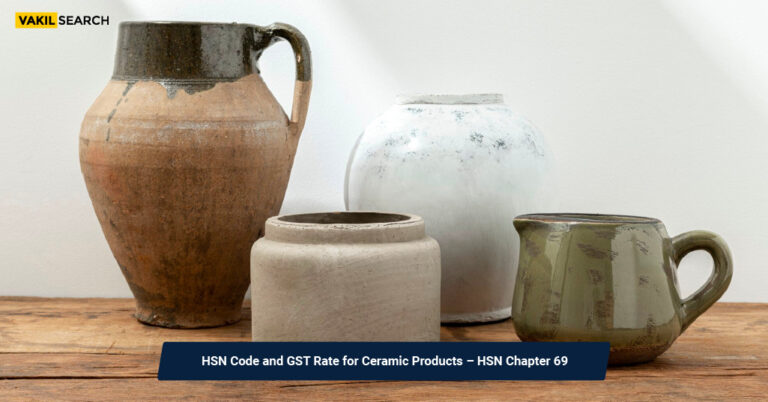As HSN Code has a wide range of implications for the textile industry, it is important to be aware of what these implications mean. This article discusses HSN Code and GST on Textile Fabrics as per HSN Chapter 59 in India.
What Is HSN Code?
HSN stands for the Harmonized System Code. It is a set of global trade standards that help to identify products and services from different countries.The HSN code is used to identify textile fabrics. Textile fabrics are made from materials such as cotton, silk, wool, and linen. They are used in clothing, bedding, upholstery, and other items.Textile fabrics are classified according to their type: plain weave, twill weave, rib weave, lace, yarn-dyeing, or serging fabric. Each type of textile fabric has its own HSN code. The textiles HSN code is composed of six digits. The first two digits indicate the country of origin. The next four digits indicate the type of textile fabric. The last two digits indicate the thickness of the fabric.
Check Here To More About: https://services.gst.gov.in/services/searchhsnsac
HSN Code and GST on Textile Fabrics as per HSN Chapter 59
Textile fabrics are considered to be of two types viz. Woven fabric and non-woven fabric. The application of GST on woven fabrics is more complex than the application of GST on non-woven fabrics. In general, the application of GST on textile fabrics is governed by section 59 of the CGST Act, 2017. Here we will discuss the applicability of GST on woven fabric and non-woven fabric separately.
Woven Fabric: As per clause (1), woven fabric includes a fabric that is composed wholly or partly of threads that are twisted together to form a yarn at any stage in the production process. This means that woven fabric includes a cotton twill, satin weave, or other similar type of weave. However, a woven fabric does not include a linen or woolen weave which are considered to be made out of carded wool or hair respectively.
Non-Woven Fabric: As per clause (2), non-woven fabric includes any material that does not fall under the definition of woven fabric. This includes materials such as films, foils, etc.
Who Is Affected by HSN Code, GST and the Required Notice Periods for Textile Fabrics?
Textiles HSN code is a unique identification code for textile products. It is mandatory to affix this code to all textile products sold in India.GST is a tax that applies to all goods and services sold in India. GST is administered by the Central Board of Excise and Customs (CBEC). All textile products sold in India must be registered with CBEC and must have a GSTIN.All textile products sold in India must have a HSN code and a GSTIN. The HSN code is mandatory for all textile products sold in India, while the GSTIN is required for all textile products that are subject to taxation under the GST regime.
Before registering for GST, calculate GST amount that needs to be paid using our GST calculator.
Textile fabrics must have a HSN code and a GSTIN if they are to be registered for taxation under the GST regime. Textile fabrics that are not subject to taxation under the GST regime do not need a HSN code or a GSTIN.The required notice periods for textile fabrics depend on the type of notification that has been issued by CBEC. The required notice periods vary depending on the type of notification that has been issued. All textile fabrics must receive at least two days’ notice before they can be subject to excise duty or custom duty.
How the Rules Apply to HSN Chapter 59 in India
If you are exporting textile fabrics to India, you will need to comply with the applicable rules that apply to HSN Chapter 59. Under this chapter, textile fabrics that are not made from cotton are considered to be luxury goods and are subject to a 10% GST rate. This means that you will need to add 10% to the price of these fabrics when calculating your export tax liability.
Some other important rules that apply to HSN Chapter 59 include the following:
- All textile fabrics must be labeled with their textiles HSN code.
- You must submit an invoice for your exports along with your shipment documents.
- You must provide proof of payment of the export tax when you submit your paperwork to customs.
The GST and HSN Code on Textile Fabrics
As per the latest amendment in the GST Login and laws, now all textile fabrics will be governed by the GST. This means that the manufacturers, traders, and dealers of textile fabrics will have to register and comply with the GST rules. This means that all textile fabric manufacturers, traders, and dealers will have to apply for registration with the GST authorities. They will need to submit a valid GST registration number and account number.The tax rate for textile fabrics has been increased from 18% to 28%. This means that manufacturers, traders, and dealers of textile fabrics will have to pay more taxes now than before.
However, there are some exemptions to the GST rules for textile fabrics. These include:
– Textile fabrics used for clothing or footwear
– Textile fabrics used in religious ceremonies or rites of passage
– Textile fabrics used in advertising or promotional activities
– Textile fabrics used for charity purposes
Textile Exemption Rules
- Section 4(1) – Exempts from Application of GST Textiles and Textile Articles Not Subject to Customs Duty
- Section 5 – Application of GST on Textile Products Manufactured From Raw Materials Which Are not subject to Customs Duty
- Section 6 – Exemption from TDS for Textile Manufacturing Plant and Product
- In addition, there are also certain other provisions in the Act which provide for exemptions or reduced rates of tax on textiles and textile products. These include:
- Section 29A – Reduction in Tax Rate on Inputs used in Textile Manufacturing
- Section 29B – Reduced Tax Rate on Domestic Raw Cotton
- Section 29C – Exemption from TCS for Woven fabrics containing jute or kapok
- Section 30A – reduction in rate of tax payable on account of export of yarn
- Section 30B – Removal of Restrictions on Export of Yarn and Woven Fabrics
- Section 84A – Exemption from TDS for Certain Machinery used in Textile Mills
Read more:-
- Process to Get HSN Code In GST
- What are Types Of GST Rate?
- HSN Code of Rice
- GST Interest Calculator
- HSN Full Form in GST
- Filing Income Tax Return
- What are GST Rates On All Goods And Services in India?










